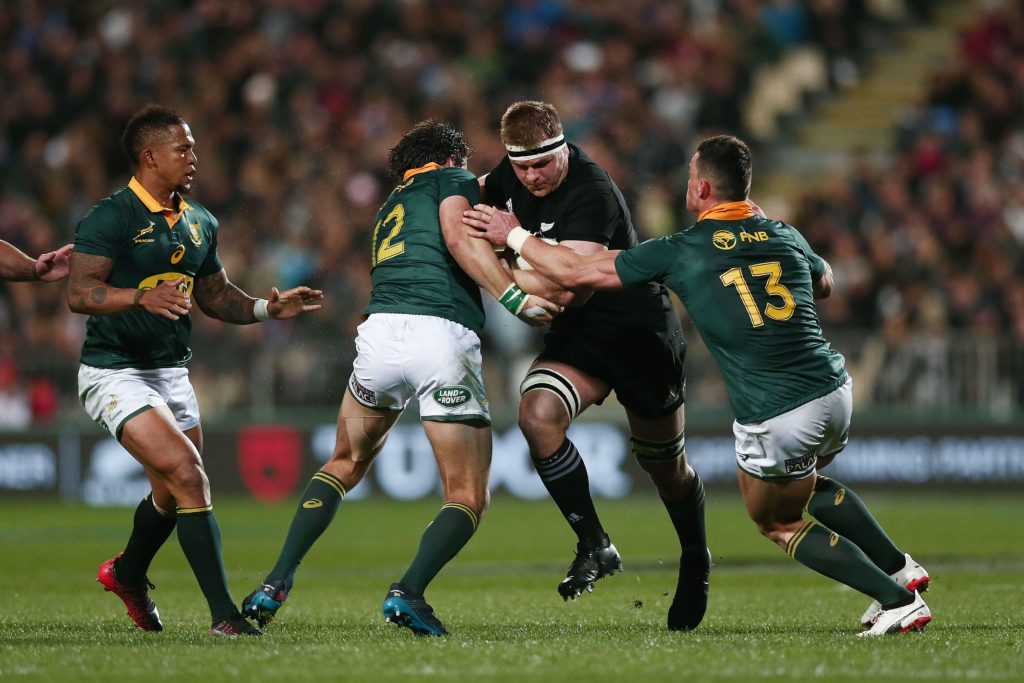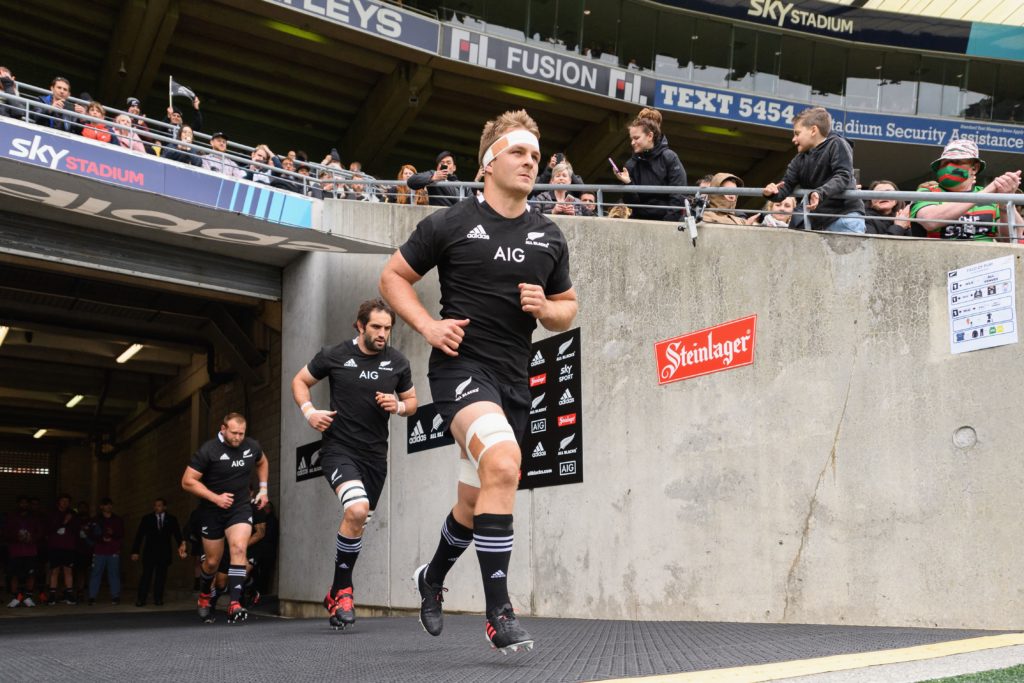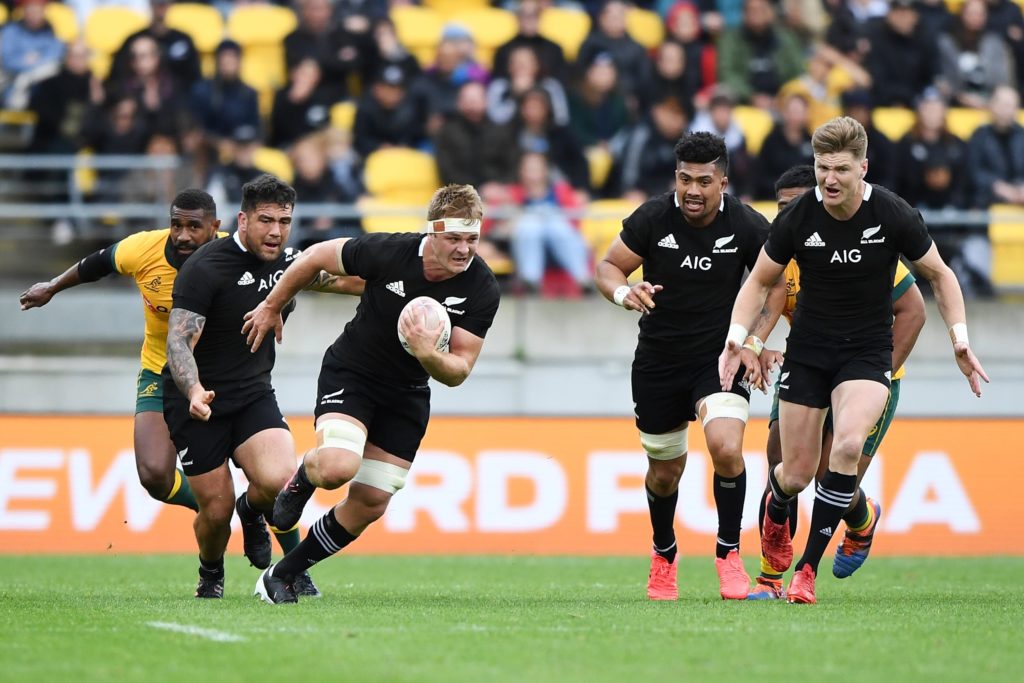48 hours before the All Blacks are to play their first test on home soil in 400 days and loose forward Ardie Savea is talking about Sam Cane.
We’re having this conversation because it’s the start of a new era and few roles in New Zealand are held in such high regard as the one that comes with the small “c” beside a name on an All Black team sheet. There is prime minister and next on the list in terms of importance and scrutiny as far as most of the public is concerned is All Blacks captain.
Cane, a 28-year-old flanker, has captained the All Blacks before but this Bledisloe Cup test against the Wallabies in Wellington is hugely significant for many reasons, not least because it’s the first time Cane, a modest young man from the small rural community of Reporoa in the Waikato region, will get the chance to prove his credentials as Kieran Read’s successor.
“For anyone to come back from an injury like that is a testament to the kind of fella he is mentally and spiritually,” Savea tells The XV. “It takes a strong man to come back like that and be able to play top-level footy. Not many guys could do that. Sammy is great – he’s mentally very strong. That’s the way he is – if there’s someone you’d want to be beside in a battle it’s him.”
Savea’s reference is to Cane’s injury two years ago – a broken neck in a test in Pretoria after he went to clean out a ruck and got his head caught in the wrong position. The result was a vertebrae broken in two places and a slight dislocation. The break was fixed by a steel plate and four screws, the dislocated vertebrae was pushed back, Cane would tell me at last year’s World Cup, “like the piece of a jigsaw puzzle”.
It takes a strong man to come back like that and be able to play top-level footy. Not many guys could do that. Sammy is great – he’s mentally very strong. That’s the way he is – if there’s someone you’d want to be beside in a battle it’s him.
All Blacks loose forward Ardie Savea
Cane walked off the Loftus Versfeld pitch for surgery and a long stay in hospital. A year later he returned for the Chiefs – his first match was against the Blues at Eden Park. He walked into a lineout and the referee said “welcome back, Sam”, a remark which echoed the thoughts of rugby supporters around the world.
It was a quiet comeback for Cane in that match but sometimes we should be thankful for small mercies. Later he would admit he probably wasn’t 100 per cent ready to get back on the field at that level but only a matter of weeks later he was again making tackle after tackle as the Chiefs somehow finished over the top of the Reds in Hamilton.
It was another step in a long journey from being a talented kid with leadership promise who was brought into the inner sanctum of All Black decision-making alongside men such as McCaw, Dan Carter and Conrad Smith after only a couple of years in the team to his being awarded the second most important job in the country.

Along the way there has been a World Cup failure in Japan, with Cane badly missed by the All Blacks in the semi-final defeat by England after he was selected on the reserves bench behind converted lock Scott Barrett and a year with the Chiefs under Warren Gatland which he and his Super Rugby teammates would rather forget.
For Cane there will be no forgetting how he discovered he would captain the All Blacks in a test for the first time.
It was in London during the World Cup in 2015 and he’d just nipped out of the team hotel to get a haircut before the pool game against Namibia when then head coach Steve Hansen got out of a taxi and asked for a word.
Hansen told Cane he was starting, which the young man was thrilled about given he was competing against Richie McCaw for game time. And then Hansen had something else to say: “You’ll also be captain”.
Cane hadn’t led the Chiefs in Super Rugby at that stage and by his own admission he struggled to connect with the referee during the match at the Olympic Stadium – “pretty poor, but a memorable experience”.
“I’m confident I know what to say at the right times – and I’m better at using other players’ leadership as well rather than feeling I have to take the whole brunt of it on my shoulders during the game,” he said last year. “That allows you to play better which is the most important part of the whole thing.”
Once Read moved on the new captain was going to be either Cane or Sam Whitelock, the 31-year-old lock and the fourth highest capped All Black in history, and there were many within in New Zealand, and particularly those residing in Crusaders territory, who believed the latter should have been given the honour by new head coach Ian Foster, but Savea’s words and the intent behind them as he speaks from an armchair at the team’s hotel are unequivocal.
Like all professional athletes, Cane knows about setbacks, but his was no ordinary injury on disappointment. In his case there was the potential that not only would he not play the game again but that he could spend the rest of his life in a wheelchair. That resolve can be contagious.
“It has certainly made me appreciate playing rugby,” Cane said during the World Cup in Japan. “It’s helped me appreciate all the other things in life. Rugby is so important to me but in that moment when I found out that I’d broken my neck it was amazing that it didn’t matter anymore. You think it means so much… all of a sudden it was about life and quality of life. At the time I was too scared to ask if I was going to be able to play rugby again. I was afraid I wouldn’t like the answer so I waited a couple of days and they told me.”

Savea is right; Cane’s return from his injury is a testament to his toughness and courage and that’s why he was the right man to be given the job and it’s what he revealed again during the extraordinary 16-16 draw against the Wallabies at the start of his reign.
The match, which pitted Foster against fellow Kiwi Dave Rennie, a head coach also making his international debut, was a slow burner perhaps due to the Covid-19-enforced disruptions, new personnel on both sides and possibly the near gale-force winds and rain, but once it caught fire in the final quarter it gripped the attention like few Bledisloe Cup tests before it.
It ran for fully eight and a half minutes over the scheduled 80 as both teams attempted to break the deadlock and among the brightest sparks was Cane, who in the final moments charged towards the line and threatened to announce himself on the world stage in a ridiculously dramatic manner. He didn’t quite make it but regardless he displayed his usual incredible work rate and defensive steel by making what was easily a game-high 25 tackles and missing precisely zero.
He was the glue which held the All Blacks together against the Wallabies who, after an incredibly difficult last year for Australian rugby, began the Rennie reign in incredible fashion. The All Blacks had to make 100 more tackles than the visitors and there are few better than Cane at holding the line.
“He’s prepared, he’s ready,” coach Foster had said during the week. “I like where he’s at. He’s been thoughtful all week. He’s a bit quiet, softly spoken. He doesn’t look grumpy and he doesn’t look happy and that’s kind of a nice place to be.”
Afterwards, as the All Blacks and Wallabies, spectators and viewers attempted to digest exactly what had happened in the finale of the test – “wild” was how Australia skipper Michael Hooper described it – lock Patrick Tuipulotu was asked about Cane’s performance in general and leadership in particular.
I like where he’s at. He’s been thoughtful all week. He’s a bit quiet, softly spoken. He doesn’t look grumpy and he doesn’t look happy and that’s kind of a nice place to be.
All Blacks coach Ian Foster
“What you see is what you get,” says Tuipulotu, who excelled as Blues captain this year. “He’s a tough worker and he doesn’t say much but when he does he backs it up with his actions. Like you say, 25 tackles and none missed, that speaks for itself. With him coming into the captaincy role now, he has a big role to play for the next couple of years. I know that during the years I’ve played with him he’s been very influential. I’m very happy for him and excited to see where it goes.”
Cane, with head bowed and blood trickling from above his right eye, plainly wanted so much more.

The draw felt like a defeat to the All Blacks, who, on balance, were probably fortunate to escape with that given Reece Hodge’s potential match-winning penalty from halfway bounced off an upright and All Blacks lock Tupou Vaa’i, on debut, was lucky not to be penalised on his line as the game descended into a frenzy when he both entered a ruck from an offside position and played the ball while off his feet.
“Obviously we wanted to win it, but I’m also really proud of the desire and attitude and in the end the willingness to keep playing,” Cane said. “I know when there is a genuine belief from within a team when you’re fighting at the end of games and there 100 per cent was from the 15 boys out there.
“There are lots of emotions. It’s funny – as buggered as I am now after a test match and result like that, I can’t wait for the next one.”
As the All Blacks begin a new era under Foster and build towards the next World Cup after the disappointment of last year, Cane’s leadership will be crucial. The first Bledisloe Cup test proved that in sport virtually nothing is guaranteed but the depth of experience Cane possesses should serve him and the team well. After all, he has passed much more difficult challenges.
There are lots of emotions. It’s funny – as buggered as I am now after a test match and result like that, I can’t wait for the next one.
All Blacks captain Sam Cane
“He’s a calm enforcer type of guy and the boys look up to him for that leadership,” Savea says.
“His aura – people naturally follow him and his leadership. What he does has a huge impact on the team.”
It sounds like he is just the man for the job.



Comments
Join free and tell us what you really think!
Sign up for free